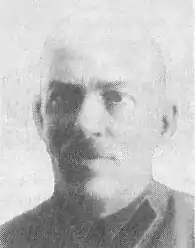Ivan Akulov
Ivan Alekseyevich Akulov (Russian: Иван Алексеевич Акулов; 24 April [O.S. 12 April] 1888 – 30 October 1937) was a leading Russian Old Bolshevik revolutionary and statesman, who for a few months was nominally second in command of the political police, the OGPU.

Career
Akulov was born in St Petersburg, son a small trader.[1] He joined the revolutionaries as a teenager, during the 1905 revolution and joined the Bolshevik faction of the Russian Social Democratic Labour Party in 1907. In 1912, he was one of the organisers of one of the largest demonstrations ever staged in St Petersburg during the reign of the Tsars, in which 60,000 factory workers participated.[2] After the Bolshevik revolution in November 1917, he was posted to Yekaterinburg, as secretary of the Ural provincial party committee of the Russian Communist Party, and from there played a leading role in establishing communist rule in Siberia, and Central Asia. He was a party secretary in Crimea, 1921–22, chairman of the Donets miners' union, 1922–27, and chairman of the Ukraine trade union council, 1927-1931.
In July 1931, Akulov was suddenly transferred to Moscow, as first deputy chairman of the OGPU. The OGPU was nominally headed by the terminally ill Vyacheslav Menzhinsky. Its effective head was Genrikh Yagoda, who was relegated to the post of second deputy chairman. This appears to have been a first attempt by Josif Stalin to wrest control of the police from Yagoda, whom he did not trust. The attempt did not work: as one senior officer after Yagoda had been ousted, five years later, "the entire party organisation in the OGPU was devoted to sabotaging Akulov."[3] In October 1932, Akulov returned to Ukraine, as First Secretary of the Donets party committee.
In 1933, Akulov was recalled to Moscow, as USSR Prosecutor General, with Andrei Vyshinsky as his deputy, in what may have been a move to build up the prosecutors' office as a counterweight to the OGPU, now that it was back under Yagoda's control. He demonstrated his loyalty to Stalin at a session of the Central Committee in January 1933, by declaring: "Stalin's policy is our policy, the policy of the entire party, It is the policy not only of the proletarian revolution in our country but of the proletarian revolution in the world. That's what Stalin's policy is all about.".[4] Even so, Stalin may have thought he was not ruthless enough to act as prosecutor at the great show trials of 1936-38. In June 1935, he was appointed to succeed Avel Yenukidze as secretary of the Central Executive Committee (CEC) of the soviets, putting him in charge of security in the Kremlin, while Vyshinsky replaced him as prosecutor general.
In 1937, after Akulov had a fall while skating, and suffered a near fatal concussion, Stalin ordered that surgeons be brought from abroad to save his life.[5] He eventually recovered and returned to work - only to be arrested on 23 July 1937. On hearing about his arrest, one of his colleagues Valentin Trifonov, courageously protested to the chairman of the Central Executive Committee, Mikhail Kalinin who took up the case with Stalin, and was bluntly told: "You always were a liberal."[1] He was shot on 30 October 1937.
References
- "Акулов Иван Алексеевич (1888–1938 гг.)". История Оренбужья. Retrieved 6 June 2018.
- Medvedev 1976, p. 217.
- McSmith, Andy (2015). Fear and the Muse Kept Watch. New York: New Press. p. 88. ISBN 978-1-62097-079-9.
- Getty, J.Arch and Naumov, Oleg V. (2010). The Road to Terror, Stalin and the Self-Destruction of the Bolsheviks, 1932-1939. New Haven: Yale U.P. p. 49. ISBN 978-0-300-10407-3.
- Medvedev 1976, p. 291.
Bibliography
- Medvedev, Roy (1976). Let History Judge, The Origins and Consequences of Stalinism. Nottingham: Spokesman.CS1 maint: ref=harv (link)